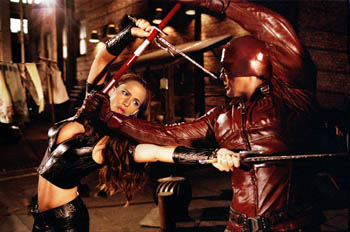![[Metroactive Movies]](/movies/gifs/movies468.gif)
[ Movies Index | Show Times | Silicon Valley | Metroactive Home | Archives ]
Radar Love
'Daredevil' comes to the screen in tepid, sometimes laughable, actioner
By Richard von Busack
I WAS CAPTIVATED by The Man Without Fear during Frank Miller's days of writing and drawing Daredevil comics in the early 1980s. The unexpectedly mature plotting and the striking graphics--particularly Miller's use of negative space--represented a breakthrough in the form. Miller brought in thousands of readers who previously had never cared about Marvel Comics' red-suited, low-cal substitute for Batman, created by Stan Lee and Bill Everett in 1964. Miller's stories pushed the Comics Code until it almost snapped. These restrictions were even tougher than Hollywood's old Production Code, declaring that a hero mustn't kill, mustn't carry a gun--even when it seemed that he was most justified.
Later, Miller left, and the crapification process started (which began in earnest when they brought Elektra back from the dead, after Miller had buried her in a snowy grave, and that's about the time I stopped reading it). Miller moved to DC Comics to create The Dark Knight Returns, about Batman's last case. The graphic novel was a national success, leading directly to four Batman films that sourced the look of Miller's comics.
Twenty years later, Daredevil arrives on the big screen, and its day-lateness and dollar-shortness make it very slight. Director/writer Mark Steven Johnson introduces almost nothing new. Ben Affleck stars as poor but honest lawyer Matt Murdock. Blinded in childhood but given extraordinary senses as compensation, he falls for martial artist Elektra (Jennifer Garner, the much vaunted star of Alias). An assassin named Bullseye (Colin Farrell) enters the picture and interferes with the romance. This killer with unerring aim murders her father, but since Elektra believes that Daredevil is responsible, she decides to hunt him down. Farrell steals the show as the mad Irish Bullseye, with a modern-primitive scarification target on his forehead. Although Michael Clarke Duncan is an imposing semimythical crime boss, he really doesn't have much to do except smoke a cigar in a significant manner. You wait in vain for Duncan's Kingpin to do something wonderful, besides pose.
Johnson, working after the Batman films have waxed and waned, is playing catch-up. He has tried to make Daredevil a more realistic hero--giving him scars and a lair full of painkillers. Supposedly, Murdock is broke, and yet he has a headquarters that must have cost beaucoup bucks. Aside from the now-derivative imagery; the "Will you accept this rose?" gesture the Kingpin makes to his cadavers (like the roses Bruce Wayne left on the sidewalk in Tim Burton's Batman); the masked lovers fighting (Batman Returns)--beyond the array of things we've seen before lies the question of what the film is trying to say. Superman (and Spider-Man) turn away from love and embrace duty; Batman turns away from love and embraces solitude. As we see in the opening, the haunted Catholic Daredevil embraces the cross in his time of crisis, but then he later has no compunction about knocking the villain through a church's stained-glass window right after he's supposedly found forgiveness. And the priest cheers him on as he vandalizes the church.
[ Silicon Valley | Metroactive Home | Archives ]
Buy 'Daredevil Visionaries: Frank Miller, Volume 1,' which compiles Miller's first nine 'Daredevil' issues as an illustrator only.
Buy 'Daredevil Visionaries: Frank Miller, Volume 2,' which compiles Miller's first 14 'Daredevil' issues as both writer and illustrator.
Buy 'Daredevil Visionaries: Frank Miller, Volume 3,' which compiles the last eight issues of Miller's first breakthrough run on 'Daredevil.'
Buy 'Daredevil Visionaries: Kevin Smith,' which reprints 'Daredevil' issues written by movie director-turned-comics scribe Kevin Smith.
Buy the 'Daredevil vs. Spider-Man' DVD, which compiles all of Daredevil's guest appearances on animated Marvel Comics superhero shows.
Buy the 'Daredevil' score album.
Buy the 'Daredevil' 'songs from and inspired by the movie' album.
![]()

Of Human Bondage Outfits: Leather- and rubber-clad Elektra (Jennifer Garner) and Daredevil (Ben Affleck) square off in the newest superhero movie.
Daredevil (PG-13; 103 min.), directed and written by Mark Steven Johnson, photographed by Ericson Core and starring Ben Affleck and Jennifer Garner, opens Friday at selected theaters valleywide.
Send a letter to the editor about this story to letters@metronews.com.
From the February 13-19, 2003 issue of Metro, Silicon Valley's Weekly Newspaper.